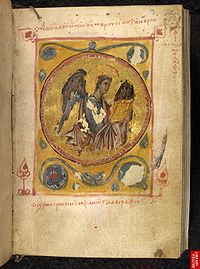- Minuscule 714
-
New Testament manuscripts
papyri • uncials • minuscules • lectionariesMinuscule 714
Evangelist MatthewName Codex Algerina Peckower 2 Text Gospels † Date 13th century Script Greek Now at British Library Size 13.8 cm by 9.5 cm Type Byzantine text-type Category V Note – Minuscule 714 (in the Gregory-Aland numbering), ε1392 (von Soden),[1][2] is a Greek minuscule manuscript of the New Testament, on parchment. Palaeographically it has been assigned to the 13th century. The manuscript is lacunose.[3][4] Scrivener labelled it as 563e.[5]
The manuscript contains also a fragment of Sentences of Peter Lombard.
Contents
Description
The codex contains the text of the four Gospels, on 338 parchment leaves (size 13.8 cm by 9.5 cm), with one lacuna (gap in the text).[3][6] It lacks texts of John 20:17-21:25.[6]
The text is written in one column per page, 22 lines per page.[3] The manuscript is ornamented, the large initial letters in red, the small initials are in red.[7]
The text is divided according to the κεφαλαια (chapters), whose numbers are given at the margin of the text and their τιτλοι (titles of chapters) are given at the top. There is also another division according to the smaller Ammonian Sections, whose numbers are given at the margin, with references to the Eusebian Canons.[6]
The manuscript contains the Epistula ad Carpianum, Prolegomena, the Eusebian Canon tables, lists of the κεφαλαια before each Gospel. It contains lectionary markings at the margin, incipits, Synaxarion, Menologion, subscriptions at the end, and numbers of στιχοι.[5][6] It contains seven miniatures in colours on gold, four of them with symbols of the four Evangelists, and three with portraits of the Evangelists (except Luke).[7]
It has very special liturgical directions.
The manuscript contains also a fragment of Sententiae of Peter Lombard (size 13 x 8 cm). The large initial letters in colours and gold, the small initials in blue.[7]
The text of the manuscript was corrected by the original scribe.[5]
Text
The Greek text of the codex is a representative of the Byzantine text-type. Hermann von Soden classified it to the textual family Kx.[8] Kurt Aland placed it in Category V.[9]
According to the Claremont Profile Method it represents Kx in Luke 1 and Luke 20. In Luke 10 no profile was made.[8]
History
Scrivener dated the manuscript to the 13th century, Gregory dated it to the 13th or 14th century.[6] The manuscript is dated by the INTF to the 13th century.[4] Place of origin is unknown.
The manuscript was brought from Corfu by Dean Burgon, then belonged to W. F. Rose, and bought for the British Museum in 1893 (along with minuscule 715, 716).[6]
It was added to the list of New Testament manuscripts by Scrivener (563) and Gregory (714). Gregory saw the manuscript in 1883.[6] The text was collated by Rose.[5]
As of 2010 the manuscript is housed at the British Library (Egerton 2783) in London.[3][4]
See also
References
- ^ Hermann von Soden, Die Schriften des neuen Testaments, in ihrer ältesten erreichbaren Textgestalt / hergestellt auf Grund ihrer Textgeschichte (Berlin 1902), vol. 1, p. 187.
- ^ Gregory, Caspar René (1908). Die griechischen Handschriften des Neuen Testament. Leipzig: J. C. Hinrichs'sche Buchhandlung. p. 73. http://www.archive.org/stream/diegriechischen00greggoog#page/n83/mode/2up.
- ^ a b c d Aland, K.; M. Welte, B. Köster, K. Junack (1994). Kurzgefasste Liste der griechischen Handschriften des Neues Testaments. Berlin, New York: Walter de Gruyter. p. 89. ISBN 3110119862.
- ^ a b c Handschriftenliste at the Münster Institute
- ^ a b c d Scrivener, Frederick Henry Ambrose; Edward Miller (1894). A Plain Introduction to the Criticism of the New Testament, vol. 1 (fourth ed.). London: George Bell & Sons. p. 256.
- ^ a b c d e f g Gregory, Caspar René (1900). Textkritik des Neuen Testaments, Vol. 1. Leipzig. p. 215. http://www.archive.org/stream/textkritikdesne00greggoog#page/n227/mode/2up.
- ^ a b c Minuscule 714 at the British Library
- ^ a b Wisse, Frederik (1982). The profile method for the classification and evaluation of manuscript evidence, as Applied to the Continuous Greek Text of the Gospel of Luke. Grand Rapids: William B. Eerdmans Publishing Company. p. 65. ISBN 0-8028-1918-4.
- ^ Aland, Kurt; Barbara Aland; Erroll F. Rhodes (trans.) (1995). The Text of the New Testament: An Introduction to the Critical Editions and to the Theory and Practice of Modern Textual Criticism. Grand Rapids: William B. Eerdmans Publishing Company. pp. 139. ISBN 978-0-8028-4098-1.
Further reading
- Gregory, Caspar René (1900). Textkritik des Neuen Testaments. 1. Leipzig. p. 215. http://www.archive.org/stream/textkritikdesne00greggoog#page/n227/mode/2up.
External links
- Minuscule 714 at the British Library
Categories:- Greek New Testament minuscules
- 13th-century biblical manuscripts
- Egerton collection
- Illuminated biblical manuscripts
Wikimedia Foundation. 2010.

